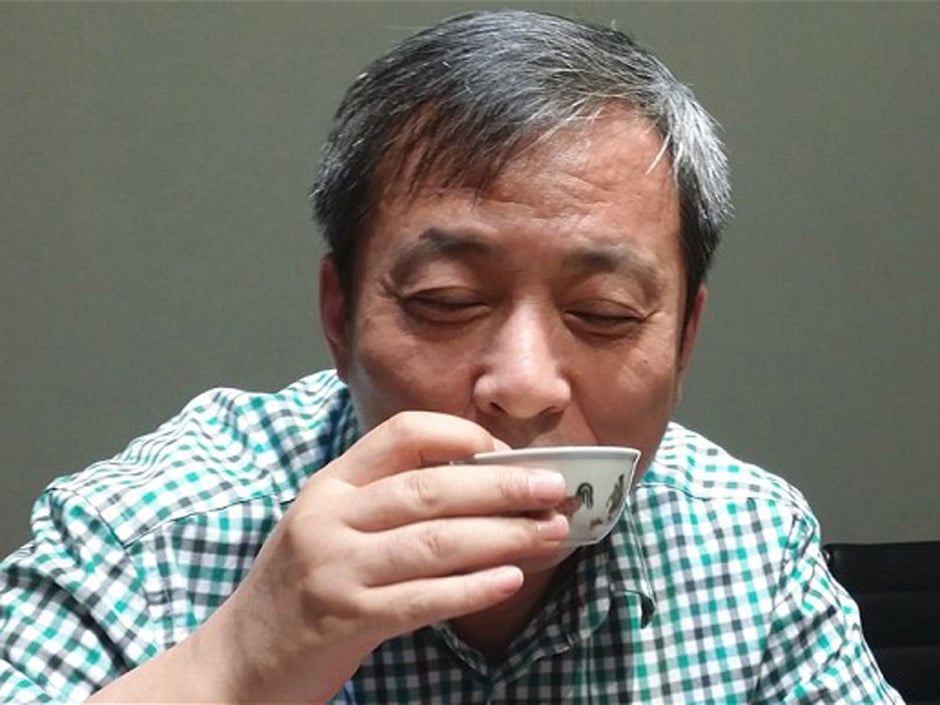
The second-most expensive artwork ever sold at auction was purchased at Christie’s New York this week by Chinese collector Liu Yiqian and his wife, Wang Wei. The couple is now the proud owner of Nu couché, a $170.4 million Amedeo Modigliani nude.
The Modigliani the biggest purchase the taxi driver-turned billionaire, who Forbes reports is worth $1.38 billion, has ever made at auction, but it’s just one of many of his high-profile acquisitions. Liu displays his collection at his Long Museum, which now has two Shanghai locations, and earned a spot on artnet News’s top 200 collectors list.
Amedeo Modigliani, Nu couché, 1917–18.
Courtesy Christie’s New York.
(It’s possible that Nu couché isn’t the only Modigliani Liu picked up at the November sales: there are rumors that he was also behind the $42.8 million sale of the artist’s portrait of Paulette Jourdain at Sotheby’s $377 million A. Alfred Taubman sale.)
Not everyone is impressed with Liu’s big-spending ways: “These are collectors that have so much money that they acquire taste or they don’t have to have to taste because they buy everything in sight” Philip Tinari, director of the Ullens Center for Contemporary Art in Beijing, told the New York Times. “There’s very little discrimination, they just buy the most expensive things. They’re not connoisseurs.” In April, Bloomberg called him “China’s gaudiest billionaire.”
Liu Yiqian and his wife Wang Wei receiving the certificate from Christie’s for their purchase of a record-priced Tibetan tapestry.
Photo: Phillipe Lopez, courtesy AFP.
(Liu’s practice of paying for his big ticket items with his American Express card, in order to maximize his reward points, is probably not helping his case.) In order to find out more, artnet News has rounded up a list of some of the formidable collector’s biggest buys.
The Meiyintang ‘Chicken Cup,’ (Ming Dynasty).
Photo: courtesy of Sotheby’s.
1. Meiyintang “Chicken Cup” (Ming dynasty)
One of 2014’s most expensive auction trophies, this Chinese porcelain cup set the record for the priciest Chinese work of art ever sold at auction when Liu bought it for $36.3 million at Sotheby’s Hong Kong in April 2014. The collector later drank directly from the priceless vessel in an outrageous photo-op.
Ming dynasty, collection of Buddhist Sutras.
Photo: courtesy Sotheby’s.
2. Collection of Buddhist sutras (Ming dynasty)
The most expensive Chinese painting ever sold outside of China, this 600-year-old album of Buddhist art and calligraphy was snapped up at Sotheby’s New York by Liu in March. The sutras were expected to sell for just $150,000, but an intense bidding war drove the price up to an astonishing $14 million.
The 15th century Buddhist tapestry broke the record for a Chinese artwork sold at auction.
Photo: Art Market Monitor
3. Embroidered silk Tibetan thangka (15th century)
Liu spent a cool $45 million on this 15th century Buddhist tapestry at Christie’s Hong Kong this past November. The purchase, which was five times the pre-sale estimate, and broke the Chinese art auction record set earlier in the year by the aforementioned “chicken cup”.
Su Shi, Gong Fu Tie (detail).
Photo: courtesy Sotheby’s.
4. Su Shi, Gong Fu Tie (c. 1790)
A controversial buy, Liu picked up this scroll, which purportedly dates to 1790, at Sotheby’s New York in September of 2013. The work’s authenticity has been contested by specialists from the Shanghai Museum, who claim it is a 19th-century copy, but Liu has stood by the scroll. At a press conference held this past February, Liu shared high-definition imagery and technical analysis of the piece supporting his belief that the characters were written naturally.
Qing Dynasty, imperial carved Zitan “Dragon” throne.
Photo: courtesy Sotheby’s.
5. Imperial carved Zitan “Dragon” throne (Qing dynasty)
After a furious bidding battle, Liu won this imperial throne in October of 2009 at Sotheby’s Hong Kong for $11.1 million, at the time a record for Chinese furniture. Despite far outstripping the comparatively paltry pre-sale estimate, which topped out at $3.9 million, Kevin Li, a Taiwanese antiques dealer, told Bloomberg that Liu “got it at a bargain,” predicting the throne’s value would skyrocket in coming years.
Guan Vase, Southern Song dynasty-era (1127–1279).
Photo: courtesy Sotheby’s.
6. Guan Vase (Song dynasty)
After 40 years in a private collection, this blue green ceramic Guan Vase was purchased during Sotheby’s Hong Kong’s spring auction season by Liu for a cool $14.7 million. The piece, with its rich crackled glaze, was made for the Song imperial court.
Tibetan bronze seated yogi, possibly Padampa Sangye.
Photo: courtesy Christie’s New York.
7. Tibetan bronze seated yogi (11th-12th century)
Part of the estate sale of pioneering Asian art collector Robert Ellsworth, this 11th- to 12th-century statue fetched $4.9 million at Christie’s New York. Liu was so excited by the proposition of purchasing the piece, which Ellsworth had displayed on the headboard of his bed, that he reportedly posted photos of himself in his underwear posed in the statue’s lotus position on social media the night before the auction. Needless to say, he prevailed in the ensuing bidding war.